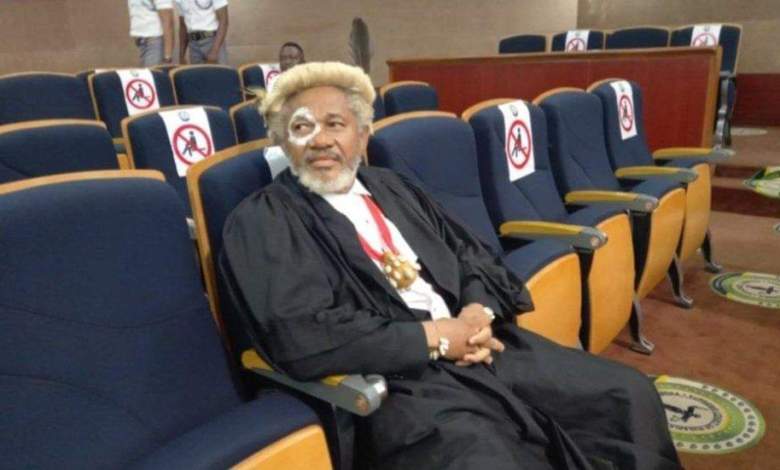A Lagos-based human rights lawyer, Malcom Omoirhobo has explained why he appeared to attend court proceedings at the Supreme Court in Abuja on Thursday in full traditional attire of an “Olokun priest”.
According to the lawyer, he dressed to court in that manner to exercise his fundamental human rights following the judgment of the Supreme Court that allowed all Nigerians to express their way of worship and the use of hijab in schools and public places.
ASHENEWS recalls that the Supreme Court last Friday, ruled in favour of Lagos female Muslim students to wear hijab to schools in the state.
Omoirhobo, who arrived at the apex court at about 9:05 am, surprised other lawyers who were seated before him in the courtroom when they saw him robed in traditional attire and barefooted with feathers attached to his wig like an herbalist.
The lawyer also wore a gourd on his necklace with cowries and a red wrapper tied around his waist, a situation that brought the court proceedings to abrupt stop when the presiding justice suddenly announced a short break.
Though it could not be immediately ascertained what was responsible for the short break.
Malcom who addressed journalists said he dressed in that manner given the Supreme Court judgement last Friday, which allowed citizens’ rights to freedom of thought, conscience, and religion.
“I am very grateful to the Supreme Court just last week Friday they made a very resounding decision that promotes Section 38 of the constitution.
“That is our right to freedom of thought, conscience, and religion. That we are free to express our way of worship in our schools and in our courts. That decision was reached on Friday and that has encouraged me.
“Because I am a traditionalist and this is the way I worship. Based on the decision of the Supreme Court this is how I will be dressing henceforth in court because I am a strong adherent to “Olokun” the god of rivers,” he said.
Malcom said the implication of the judgement was that every Nigerian, including doctors, police, military students, and journalists, can now wear their mode of worship in public places.
He added that he was not against the judgement rather he was happy with the decision because it strengthened and enriched the rights of all Nigerians as stipulated in the 1999 Constitution of the Federal Republic of Nigeria as amended.


